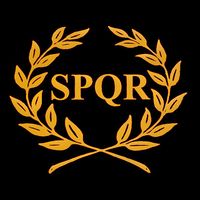Epicureanism
From NovaRoma
(Difference between revisions)
| Line 4: | Line 4: | ||
It was known, to Rome, from the mid 2nd Century B.C. as a philosophical school and a way of life. It was immenesely popular in Italy during the 1st Century B.C. but by the 2nd Century A.D Stoicism was paramount. | It was known, to Rome, from the mid 2nd Century B.C. as a philosophical school and a way of life. It was immenesely popular in Italy during the 1st Century B.C. but by the 2nd Century A.D Stoicism was paramount. | ||
:pleasure was the ''telos'' of epicureanism | :pleasure was the ''telos'' of epicureanism | ||
| − | :ataraxia | + | :ataraxia αταραζια |
| − | :live unobtrusively | + | :live unobtrusively λαθε βιωσας |
Revision as of 07:46, 23 December 2007
Home| Latíné | Deutsch | Español | Français | Italiano | Magyar | Português | Română | Русский | English
Epicureanism is a school of philosophy founded upon the teachings of its founder Epicurus It was known, to Rome, from the mid 2nd Century B.C. as a philosophical school and a way of life. It was immenesely popular in Italy during the 1st Century B.C. but by the 2nd Century A.D Stoicism was paramount.
- pleasure was the telos of epicureanism
- ataraxia αταραζια
- live unobtrusively λαθε βιωσας
Prominent Roman Epicureans:
Greek teachers in Italy:
- Philodemus
- Siro
- M. Pompilius Andronicus
Epicurean vocabulary:
- hortulus
- contubernium
- contubernales
- quies
- voluptas
